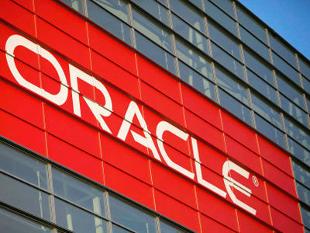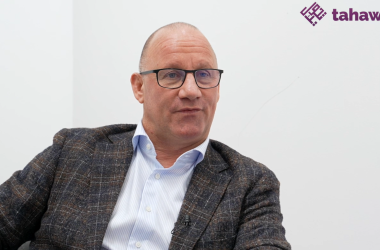Steve Miranda, Oracle’s executive vice president of applications product development, explains how AI-embedded business apps can benefit the enterprise, why change is needed to keep pace with the future and how the tech giant is helping its products think for themselves.
 Do you think Oracle is now considered as one of the world’s leading AI companies, along with the likes of Google, Facebook and Microsoft?
Do you think Oracle is now considered as one of the world’s leading AI companies, along with the likes of Google, Facebook and Microsoft?
People that I follow in the tech world focus their expertise in areas that they’re already strong. In other words, if you’re a consumer company, and you deal a lot with consumers over the phone, or with consumer electronics in the home, you have added AI either to your mobile devices or to your home. A lot of those tech companies receive publicity because they’re introducing consumer-driven products, which is where they’re strongest. We’ve always been strong on the business apps side of things, so where we’re investing is not necessarily in things like natural language support, where Siri and Alexa are getting better. We’re working on business-driven algorithms – who you’re going to sell to, what’s the best offer for that employee, what’s the best payment to make to a given supplier. As our customers use our apps, they’ll feed and improve our algorithms. There’s no way of catching up with some of these tech companies in the consumer business, because their algorithms get better and better because they have more consumers.
Is the UAE’s appointment of the world’s first minister of AI a risk given its global exposure?
It’s an unknown, but it’s better to move and go forward rather than be left behind. I think it’s a bigger risk for the UAE and other organisations to do nothing while the world is changing, rather than to have some investment and figure out what the future may hold. No, I don’t think it’s a big risk, and would be more of a risk not to invest in the future of technology.
Are advanced AI solutions an affordable and realistic prospect for Middle East enterprises?
I’ve been quite surprised at the expectation of customers in this region, who already expect AI to be there today. Our approach is to take AI and embed it into applications. We could charge for apps on top of our database, but as with everything, we can’t charge unless the customer will see value, either from cost savings or growth. At this stage, we’re confident this’ll happen to both, and frankly, people are expecting recommendations and machine to detect patterns and give suggestions.
What kinds of extra services can customers expect from your apps as a result of embedded AI?
There’s two main parts to that. We have AI-specific applications, like Next Best Offer and Next Best Action. Within our existing apps, we now also have AI-driven navigation. When an office admin logs in on Friday afternoon at 5pm, it will log in to her timecard. We’ve used AI to figure out how to filter the 1% of approval requests that are sent to managers which are incomplete or need to be sent back. We now give AI-driven recommendations, which will be pervasive throughout our existing apps. We’re rethinking everything in terms of AI – financials, CRM, HR apps.
On the database side, last October, we announced our Autonomous Database, an AI-driven database which does maintenance and is self-sustaining. We host it on behalf of our customers. Anything you would typically have a database administrator doing, from maintaining and sizing or performance tuning, we’ve used AI to take that work away and make it 100% autonomous. It’s a lot less expensive and more reliable as it eliminates human error.
What kind of investment has that needed from you in terms of skills and infrastructure?
It revolves around four components, three of which are brand new to Oracle. First is data. If you look at the investments we’ve made in apps, from BlueKai to Datalogix, we’ve done a tonne of acquisitions of companies that aggregate data, including personal data for marketing and sales purposes. We’re using that data to drive the AI. Second is compute power. Apps are running in data centres so that you can have the AI learn at a faster rate, so there’s that investment in terms of cloud-based apps and infrastructure.
Third is data scientists, who, along with existing product managers, can put into practice what the data is telling you and what the AI is recommending, the use cases of how it can affect the application. Data scientists are a brand-new area of investment to Oracle. We’ve substantially upgraded our investment into AI and data scientists.
Fourth is the applications themselves. We build recommendations which surface within the app. The app takes action on them, then that’s what we use to feed the app, which gets better over time. Then of course, our SaaS-based applications, which have been augmented for the AI piece.
If customers opt for purchasing your AI-based solutions, will that increase the risk of them being locked into partnering with you?
We compete every day against competitors new and old, and so we never look at it as being locked in. I’ve met with a bunch of customers in Dubai, none of which are here to tell me they feel that way, all of whom tell us things they’d like to see in our software. When we have happy customers, they stay with us, and unhappy ones move on. Are we stickier than others? I keep using my iPhone because it’s a pain for me to change. It’s linked to my Apple TV, laptop and contacts. Am I locked in? not really. I can change. Is it going to be a pain if I change? Absolutely. I think our customers view it similarly.
Do you think AI and automation will put people out of jobs?
I think jobs are always changing, and technology has always changed the jobs that are available. We can all agree, whether it’s the last five, 10 or 50 years, we’ve all got a lot more automation in the world, and the vast majority of the world’s economy has grown, and jobs have grown along the way. Are they the same jobs that existed 20 years ago? Absolutely not. If anything, we see the speed of change increasing, and so it’s important to give organisations solutions that enable them to keep pace with that change.





